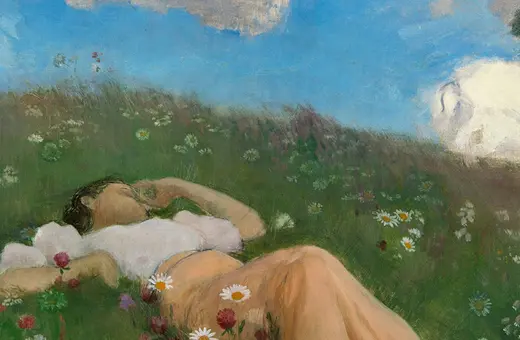In this interview, philosopher and Nietzsche scholar, Babette Babich argues we must stop searching for life’s purpose in the realms of both science and religion. Instead, life must be appreciated through an admiration of its beauty and its poetry. We must love life’s constant change and becoming, and admire it, as much as is possible, from the perspective of eternity.
See Babette Babich live in London at the HowTheLightGetsIn festival alongside Slavoj Zizek, Sadiq Khan, Phillipa Gregory and many more speakers, musicians and comedians. Book your place now.
Ricky Williamson: You are appearing in three debates at this year's HowTheLightGetsIn festival. One on whether aesthetics should be our highest value, one on language, and one on purpose in life. All relate nicely to your work on Nietzsche. Starting with aesthetics…
Nietzsche of course said many very interesting things about aesthetics. One of those things was this, "it is only as an aesthetic phenomenon that existence and the world are eternally justified." I take this as meaning that existence cannot be justified morally, or by having meaning. Rather, existence is only justified in the sense that a work of art is justified. So we must make existence an aesthetically good enough work of art to be justified. If you accept the question on these terms... how can we make existence aesthetically good enough to be justified eternally?
Babette Babich: This is a very challenging question! And you are quite correct when you say that existence, for Nietzsche, is justified neither ‘morally nor by having meaning.’ It seems to me that Nietzsche does not disagree with Byron when he writes in his She Walks in Beauty from his Hebrew Melodies, reflecting: One shade the more, one ray the less, in keeping with the ethos of HowTheLightGetsIn.
But how are we to make existence “aesthetically good enough” as you say? We have the lovely notion of wabi-sabi for artists (and philosophers of existence) and there is kintsugi — should there be cracks and supposing we find ourselves with sufficient resources, in the form of gold. In general, we suppose wealth a fair prerequisite for what we call a beautiful life, but this does not seem to be what Nietzsche was talking about.
___
What we allow into our sight makes all the difference as the abyssal or monstrous as he says, looks into us.
___
Striking for me is that Nietzsche thinks about where we find ourselves, the view we take on things, and he emphasizes that our disposition or mood makes all the difference. Thus he promises himself not to denigrate ugliness as that initiates a cycle of recoil but only to look away, it’s unclear he achieves this, but that is what he says. What we allow into our sight makes all the difference as the abyssal or monstrous as he says, looks into us. To be the poets of our lives requires a certain focus.
I should add, but this goes further than the scope of this conversation, that the idea of an aesthetic justification of existence corresponds to Nietzsche’s world artist. Seeing existence from the perspective of this ‘world artist,’ here Nietzsche agrees with Plato, affords the needed aesthetic distance — Plato says we are not to take anything human too seriously — the vantage of eternity as the point of view of the world artist.





















Join the conversation